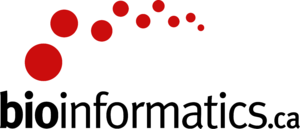Ontario Institute for Cancer Research
Mozilla, 366 Adelaide Street West, TorontoMay 12-13, 2014
9:00 am - 4:30 pm
General Information
Software Carpentry's mission is to help scientists and engineers become more productive by teaching them basic lab skills for computing like program design, version control, data management, and task automation. This two-day hands-on bootcamp will cover basic concepts and tools; participants will be encouraged to help one another and to apply what they have learned to their own research problems.
This workshop is aimed at graduate students, post-docs, and other researchers intending to do workshops this summer through bioinformatics.ca. To register, please visit this page on the bioinformatics.ca web site.
Details
Instructors: Joshua Ainsley, Abigail Cabunoc, Greg Wilson
Where: Mozilla, 366 Adelaide Street West, Toronto. Get directions with OpenStreetMap or Google Maps.
Requirements: Participants must bring a laptop with a few specific software packages installed (listed below).
Contact: Please mail gvwilson@software-carpentry.org for more information.
Syllabus
- Using the Unix shell and Make to automate tasks
- programming in R
- using version control to manage and share information
- how (and how much) to test programs
- making R packages
- reproducible research
Setup
To participate in a Software Carpentry bootcamp, you will need working copies of the software described below. Please make sure to install everything (or at least to download the installers) before the start of your bootcamp.
Overview
Editor
When you're writing code, it's nice to have a text editor that is optimized for writing code, with features like automatic color-coding of key words. The default text editor on Mac OS X and Linux is usually set to Vim, which is not famous for being intuitive. if you accidentally find yourself stuck in it, try typing the escape key, followed by ':q!' (colon, lower-case 'q', exclamation mark), then hitting Return to return to the shell.
The Bash Shell
Bash is a commonly-used shell. Using a shell gives you more power to do more tasks more quickly with your computer.
Git
Git is a state-of-the-art version control system. It lets you track who made changes to what when and has options for easily updating a shared or public version of your code on github.com.
R
R is a programming language that specializes in statistical computing. It is a powerful tool for exploratory data analysis. To interact with R, we will use RStudio, an interactive development environment (IDE).
SQL
SQL is a specialized programming language used with databases. We use a simple database manager called SQLite, either directly or through a browser plugin.
Windows
Editor
Notepad++ is a popular free code editor for Windows. Be aware that you must add its installation directory to your system path in order to launch it from the command line (or have other tools like Git launch it for you). Please ask your instructor to help you do this.
Git Bash
Install Git for Windows by download and running the installer. This will provide you with both Git and Bash in the Git Bash program.
R
Install R by downloading and running this .exe file from CRAN. Also, please install the RStudio IDE.
SQLite
Download the sqlite3 program and put it in the directory where you are running examples. Alternatively, you may install the Firefox SQLite browser plugin described below.
Mac OS X
Bash
The default shell in all versions of Mac OS X is bash,
so no need to install anything. You access bash from
the Terminal (found
in /Applications/Utilities). You may want
to keep Terminal in your dock for this workshop.
Editor
We recommend
Text Wrangler or
Sublime Text.
In a pinch, you can use nano,
which should be pre-installed.
Git
Install Git for Mac by download and running the installer.
R
Install R by downloading and running this .pkg file from CRAN. Also, please install the RStudio IDE.
SQLite
sqlite3 comes pre-installed on Mac OS X.
Alternatively,
you may install the Firefox SQLite browser plugin described below.
Linux
Bash
The default shell is usually bash,
but if your machine is set up differently
you can run it by opening a terminal and typing bash.
There is no need to install anything.
Git
If Git is not already available on your machine you can try
to install it via your distro's package manager
(e.g. apt-get).
Editor
Kate is one option for Linux users.
In a pinch, you can use nano,
which should be pre-installed.
R
You can download the binary files for your distribution
from CRAN. Or
you can use your package manager, e.g. for Debian/Ubuntu
run apt-get install r-base. Also, please install
the
RStudio IDE.
SQLite
sqlite3 comes pre-installed on Linux.
Alternatively,
you may install the Firefox SQLite browser plugin described below.
Miscellaneous
Firefox SQLite Plugin
Instead of using sqlite3 from the command line,
you may use this plugin
for Firefox instead.
To install it:
- Start Firefox.
- Go to the plugin homepage.
- Click the "Add Now" button.
- Click "Install Now" on the dialog that appears after the download completes.
- Restart Firefox when prompted.
- Select "SQLite Manager" from the "Tools" menu.

